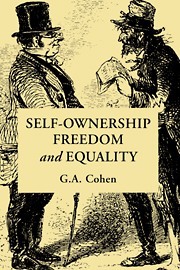Book contents
- Frontmatter
- Contents
- Preface
- Acknowledgements
- Introduction: history, ethics and Marxism
- 1 Robert Nozick and Wilt Chamberlain: how patterns preserve liberty
- 2 Justice, freedom, and market transactions
- 3 Self-ownership, world-ownership, and equality
- 4 Are freedom and equality compatible?
- 5 Self-ownership, communism, and equality: against the Marxist technological fix
- 6 Marxism and contemporary political philosophy, or: why Nozick exercises some Marxists more than he does any egalitarian liberals
- 7 Marx and Locke on land and labour
- 8 Exploitation in Marx: what makes it unjust?
- 9 Self-ownership: delineating the concept
- 10 Self-ownership: assessing the thesis
- 11 The future of a disillusion
- Bibliography
- Index of names
- Subject index
Introduction: history, ethics and Marxism
Published online by Cambridge University Press: 29 August 2009
- Frontmatter
- Contents
- Preface
- Acknowledgements
- Introduction: history, ethics and Marxism
- 1 Robert Nozick and Wilt Chamberlain: how patterns preserve liberty
- 2 Justice, freedom, and market transactions
- 3 Self-ownership, world-ownership, and equality
- 4 Are freedom and equality compatible?
- 5 Self-ownership, communism, and equality: against the Marxist technological fix
- 6 Marxism and contemporary political philosophy, or: why Nozick exercises some Marxists more than he does any egalitarian liberals
- 7 Marx and Locke on land and labour
- 8 Exploitation in Marx: what makes it unjust?
- 9 Self-ownership: delineating the concept
- 10 Self-ownership: assessing the thesis
- 11 The future of a disillusion
- Bibliography
- Index of names
- Subject index
Summary
1. When I was a young lecturer at University College, London, I taught subjects that were not closely related to my research interests. I was hired, in 1963, to teach moral and political philosophy, but I wrote about Karl Marx's theory of history, for I passionately believed it to be true, and I wanted to defend it against criticism that was widely accepted but which I considered (and consider) to be misjudged. To be sure, I did also have views about issues in moral and political philosophy, but those views did not generate any writing. I had, in particular, strong convictions about justice and about the injustice of inequality and of capitalist exploitation, but I did not think that I had, or would come to have, anything sufficiently distinctive to say about justice, or about capitalist injustice, to be worth printing.
My conception of moral and political philosophy was, and is, a standardly academic one: they are ahistorical disciplines which use abstract philosophical reflection to study the nature and truth of normative judgements. Historical materialism (which is what Karl Marx's theory of history came to be called) is, by contrast, an empirical theory (comparable in status to, for example, nineteenth-century historical geology) about the structure of society and the dynamics of history.
- Type
- Chapter
- Information
- Self-Ownership, Freedom, and Equality , pp. 1 - 18Publisher: Cambridge University PressPrint publication year: 1995



